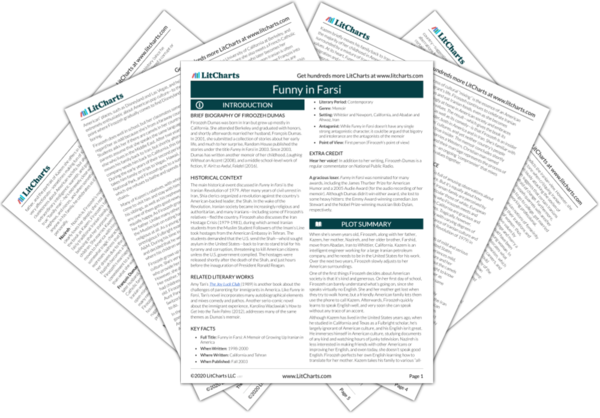Funny in Farsi is full of amusing observations about American culture. But it’s equally about how Firoozeh and her Iranian family are perceived by non-Iranian Americans, in particular those of white, European heritage. Many of the Americans who Firoozeh meets and befriends during her childhood in California are gracious and accepting of many different cultures. Tragically, however, others treat Firoozeh and her family with varying degrees of prejudice, sometimes rooted in ignorance of Iranian culture and sometimes (especially after the Iranian Revolution of 1979) in active hatred for Iranians.
Firoozeh experiences many different kinds of mild and serious prejudice as an Iranian-American in the United States. Especially when she’s a young child, she experiences mild, somewhat innocent ignorance about her culture and her heritage. Her classmates ask her questions about the camels and sand in Iran. At other times, parents, who ought to know better, treat Firoozeh in a mildly prejudiced manner as well—for example, assuming that she can speak the same language as anyone else who’s from the Middle East.
After the Iranian Revolution, however, Firoozeh’s family endures more serious forms of bigotry. Especially after the Iran Hostage Crisis, when student revolutionaries held American citizens in the American embassy in Tehran hostage, Kazem faces systematic discrimination because he’s Iranian: he can’t find a job, even though he’s a great engineer and has absolutely no ideological interest in the Iranian Revolution. Later in her life, when she’s at Berkeley, Firoozeh experiences other forms of prejudice that are harder to categorize: some of her classmates, who would be horrified to be accused of bigotry, treat her as “exotic” because of her Iranian heritage. This kind of behavior is sometimes called “soft bigotry,” since it involves treating people from other cultures condescendingly, even if it doesn’t involve any overtly negative or hateful behavior.
Although she describes many different forms of prejudice that her family faces in the United States, Firoozeh takes great care to emphasize that America itself is a tolerant, generous country—suggesting that any instances of bigotry are aberrations from the usual state of American society. (This is certainly a disputable claim, but it’s the view the book as a whole takes.) She stresses that America was always a highly tolerant country before the Iranian Revolution. Furthermore, when describing the prejudice that Kazem faces when applying for work—probably the nastiest and most pervasive kind of prejudice described in the memoir—she doesn’t discuss any specific instances of bigotry, and stresses that Kazem himself never loses his faith in America. In this way, one could argue, Firoozeh preserves her idea of America’s “innocence.” She believes that there’s certainly bigotry in America, but asserts that American culture and values themselves are free of this bigotry.
Prejudice ThemeTracker

Prejudice Quotes in Funny in Farsi
I had no idea where the screamer was from, but I knew he wasn't Iranian. A gerbil would never mistake a hamster for a gerbil, and I would never mistake a non-Iranian for an Iranian. Despite the belief of most Westerners that all Middle Easterners look alike, we can pick each other out of a crowd as easily as my Japanese friends pick out their own from a crowd of Asians.

Unlock explanations and citation info for this and every other Funny in Farsi quote.
Plus so much more...
Get LitCharts A+When my parents and I get together today, we often talk about our first year in America. Even though thirty years have passed, our memories have not faded. We remember the kindness more than ever, knowing that our relatives who immigrated to this country after the Iranian Revolution did not encounter the same America. They saw Americans who had bumper stickers on their cars that read "Iranians: Go Home" or "We Play Cowboys and Iranians." The Americans they met rarely invited them to their houses. These Americans felt that they knew all about Iran and its people, and they had no questions, just opinions. My relatives did not think Americans were very kind.
Have you noticed how all the recent serial killers have been Americans? I won't hold it against you.
After three months of rejections, I added “Julie” to my résumé. Call it coincidence, but the job offers started coming in. Perhaps it's the same kind of coincidence that keeps African Americans from getting cabs in New York.
It’s not what we eat or don't eat that makes us good people; it's how we treat one another. As you grow older, you'll find that people of every religion think they're the best, but that's not true. There are good and bad people in every religion. Just because someone is Muslim, Jewish, or Christian doesn't mean a thing.
Nobody asked our opinion of whether the hostages should be taken, and yet every single Iranian in America was paying the price. One kid throws a spitball and the whole class gets detention. For my father to be treated like a second-class citizen truly stung. If there were ever a poster child for immigration, it would be Kazem.
Apparently, some people thought that my Parisian accent was too authentic for a foreigner. Perhaps taking their cue from Detective Clouseau, a couple of the judges decided to do a little investigative work.
I could only hope that my wedding would work a bit of magic for this uninvited guest. I like to think that she eventually found a husband, a tall Iranian doctor maybe, or perhaps a short Mexican businessman with a big heart, or a medium-built Irish Catholic book vendor whose family thinks she's the best thing that ever happened to their son.
I remembered how much I admired Jane Fonda's nose when I was in fourth grade in Tehran, and how much I hated my own. Thinking of all that wasted energy, I wanted to scream and tell my fellow countrymen and countrywomen that a nose by any other name is just a nose.











